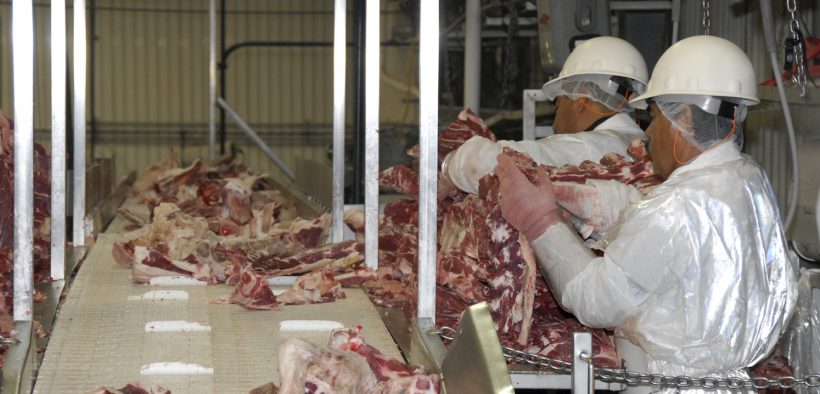USDA Moves To Let Slaughterhouses Self-Regulate, Risking Food Safety

While USDA inspectors will still be present at every plant, the agency estimates that there will be as much as a 40% decrease in inspectors at some facilities.
The U.S. Department of Agriculture (USDA) changed rules on pork slaughterhouses inspections Tuesday, cutting requirements for food inspections and caps on pork plant line speeds. Critics argue the change will make food safety testing inadequate, make work more dangerous for workers, and increase the likelihood of a foodborne illness outbreak.
“This regulatory change allows us to ensure food safety while eliminating outdated rules and allowing for companies to innovate,” Agriculture Secretary Sonny Perdue said in a statement Tuesday unveiling the new rule.
The rule will allow factory workers, rather than USDA inspectors, to perform inspection duties like removing potentially dangerous meat.
Previous administrations have delayed making the rule change, which has been under consideration for the last 20 years. But the Trump administration has accelerated its implementation, prompting the USDA’s Office of the Inspector General to open a probe into whether the agency hid information and used inaccurate data on worker safety to evaluate the new hog inspection system.
“Today’s USDA rule sends a clear message that this administration values corporate profits more than the safety of America’s food and workers,” said the United Food and Commercial Workers, a group that represents 30,000 pork plant workers nationwide. “Increasing pork plant line speeds is a reckless corporate giveaway that would put thousands of workers in harm’s way as they are forced to meet impossible demands.”
While USDA inspectors will still be present at every plant, the agency estimates that there will be as much as a 40% decrease in inspectors at some facilities. Patty Lovera, a food industry critic with the nonprofit group Food and Water Watch, told NPR that the change “ups the pressure on that last USDA inspector to be the last line of defense.”
“We call it privatizing inspections,” Lovera told NPR. Lovera notes that employees will now have to take on the duties of independent inspectors without proper training, and that increased line speed could imperil workers.
The agency, which is considering making similar changes to beef inspection, has received pushback to the rule change.
“It’s no surprise that the public is opposed to this,” wrote Thomas Gremillion and Deborah Berkowitz for the Hill. “Not only were there close to 80,000 comments from the public sent to USDA opposing this rule, but a survey found an overwhelming majority of Americans — in all parts of the country and across party lines — were opposed to this controversial rule.”
“The implementation of the rule will result in the fox guarding the henhouse,” Wenonah Hauter, executive director of Food and Water Watch, wrote in a statement. “With less government oversight over hog slaughter inspection, big meat companies will have the freedom to inspect themselves and push towards their goal of increasing line speeds. There’s no doubt about it: faster line speeds + less inspection = more food contamination.”










The meat packing plants were terrible prior to meat inspectors in the plants. MONEY can’t be the only motivator for changes that this administration makes, when people start to die all involved in these changes should be held accountable and possibly put in jail and fined.
I’ve been toying with vegetarianism for a while now. Thanks for the boost.
For those that think that carnivores contribute to climate change, this should help.
I hope news coverage of those that get sick is more prevalent than a Tesla catching on fire.
Human beings are by nature omnivores. An optimal diet includes meat. But we have strayed far, far — much too far — from our evolutionary true selves.
The most unsustainable thing in the world is human overpopulation, and it has countless ramifications — all bad.. Population is unregulated, and it is self-regulating only in the sense that all overpopulation by animal species is eventually “cured” by a population crash.
I’ve had a life, and I’m glad that it included some delicious hamburgers (the bes twot I ever had were from a truck stop in Kansas and — of all places — a hotel grill in Marrakech). But, for younger generations it’s going to be lemming-time.
Corporatocracy (the virulent variant of plutocracy) is nearly complete now.
An astute student of history noted that great nations more often than not fall into ruins, not by conquest of some other nation, but by a process of “internal rot”. The rot is centered upon chronic accretion of wealth and power by special interests.
Happy, Ronnie?
I guess they’re doing this because self-regulating gun ownership has worked so well.